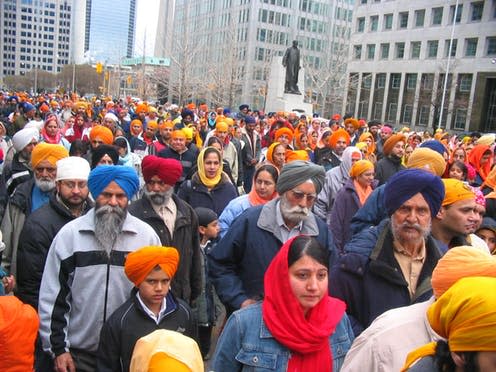Alarm spreads in Sikh diaspora at arrest of British man Jagtar Singh Johal in India

Jagtar Singh Johal, a Sikh born and raised in Scotland visiting India for his wedding, was taken into custody by the Punjab police along with three other men on November 4. The case has raised alarm among Sikhs in India and across the Sikh diaspora with concerns being raised about the due process around Johal’s arrest and subsequent allegations of torture.
With no charges yet made against Johal, on November 7, the Punjab police stated that these four arrests had solved eight murder cases relating to the targeted killings of several high-profile figures in the Indian state. Subsequent reports stated that Johal was arrested for “influencing the youth through social media”.
Johal was not seen in person again until a court appearance on November 14, after which his lawyer claimed his client had been given electric shocks and subjected to “body separation techniques”. On November 16, Sikhs from across the UK gathered outside the Foreign and Commonwealth Office (FCO) in London to protest about the treatment of Johal since his arrest in Punjab resulting in a meeting between campaigners and FCO representatives. Johal is due to reappear in court on November 30.
Sikhs mobilised
The reports about Johal’s torture have been denied by the Punjab police. The British prime minister, Theresa May, stated on November 20 that FCO representatives had met with Johal and were “watching what is happening with concern”. FCO minister Rory Stewart told parliament that the British government would “take extreme action if a British citizen is being tortured.”
The #FreeJaggiNow campaign which emerged on Twitter in response to the treatment of Johal in custody is currently providing updates of his situation.
Reports that Johal could be accused of radicalising individuals through what is claimed to be an involvement in running the neverforget84.com website about the lead up and aftermath of the events of Operation Bluestar in 1984, have left many Sikhs across the diaspora wondering if they could also face charges when visiting India.
Memories of 1984
The storming of Harmandir Sahib, often referred to as the Golden Temple, during Operation Bluestar in June 1984 and the violence that took place against Sikhs across India in November that year following the assassination of the Indian prime minister, Indira Gandhi, by her Sikh bodyguards, remain traumatic events for many Sikhs. They fundamentally changed the nature of Sikh activism across the diaspora. In recently published research examining reports of Sikh radicalisation in Britain, I found that the events of 1984 remain the main political narrative which drives Sikhs to political activism.
Before 1984, Sikhs in Britain generally supported India and were mainly focused on campaigning for the right to maintain Sikh symbols in Britain. The events of 1984 led many Sikhs across the diaspora to protest against what many of those I interviewed regarded as state-sanctioned violence against the Sikhs in the months and years that followed. A number of Sikh individuals and organisations are now engaged in raising awareness and working to achieve justice for those affected both during and after these events. Recent years have seen Sikhs across the diaspora focusing on the plight of Sikh political prisoners. For these Sikh activists, Johal is regarded as an individual who was involved in raising these issues.
The claims of Johal’s torture have also shocked many, bringing back memories of allegations of human rights abuses committed by the Punjab Police during the 1990s, that were reported by Amnesty International. One of the most disturbing pieces of literature I came across during my research was a 1996 report by the Medical Foundation containing images of Sikhs being tortured in police custody. In its study of 95 Sikh refugees seeking asylum in the UK, 82 of the Sikh refugees interviewed by the Medical Foundation claimed that they had been beaten unconscious on one or more occasion, with 57 reporting that they had been suspended by the wrists, ankles or hair and then beaten.
Sikhs across the diaspora are mobilising through the #FreeJaggiNow campaign to raise awareness of Johal’s case. For now, the focus is on the fact that due process has not been followed. The handling of Johal’s case is already having an impact on the relationship between Sikhs in the diaspora and the Indian state. It led to a recent protest against Indian diplomats in Melbourne. Whatever the outcome, Johal’s case threatens to permanently affect the relationship between Sikhs in the diaspora and the land of their gurus.
This article was originally published on The Conversation. Read the original article.

Jasjit Singh receives funding from the Arts and Humanities Research Council and CREST (The UK Centre for Research and Evidence on Security Threats)

 Yahoo News
Yahoo News 